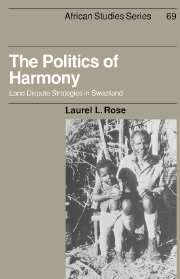Book contents
- Frontmatter
- Contents
- List of figures, tables and maps
- List of cases
- Acknowledgements
- Glossary
- Introduction
- PART I NATIONAL AND LOCAL SETTINGS
- PART II HARMONY AND LAND
- 4 The politics of harmony: land dispute strategies
- 5 Land dispute cases in the Swazi hierarchy
- 6 ‘A woman is like a field’: Swazi women's land dispute strategies
- 7 ‘How could I take my land dispute to the person with the stick?’: Swazi elites' land dispute strategies
- 8 Conclusions
- Appendix
- Notes
- References
- Index
- Other books in the series
4 - The politics of harmony: land dispute strategies
from PART II - HARMONY AND LAND
Published online by Cambridge University Press: 01 October 2009
- Frontmatter
- Contents
- List of figures, tables and maps
- List of cases
- Acknowledgements
- Glossary
- Introduction
- PART I NATIONAL AND LOCAL SETTINGS
- PART II HARMONY AND LAND
- 4 The politics of harmony: land dispute strategies
- 5 Land dispute cases in the Swazi hierarchy
- 6 ‘A woman is like a field’: Swazi women's land dispute strategies
- 7 ‘How could I take my land dispute to the person with the stick?’: Swazi elites' land dispute strategies
- 8 Conclusions
- Appendix
- Notes
- References
- Index
- Other books in the series
Summary
Law, ideologies and power
Law
Law has been defined as that which ‘consists of general rules of external human action subject to enforcement by the coercive authority of the State or legal order’ (Jacob 1986: 17; see also Rosenblum 1955: 2). In industrialized, complex states, ‘the law’ is recorded and widely understood as abstract, recorded ideas or values that derive legitimacy without obligatory reference to any individual. As a contrast, in developing countries such as Swaziland, subsystems of law, for example customary land law, may not be recorded and may be understood as ideas or values that derive legitimacy through reference to both cultural tradition and the stature of a particular individual or individuals. Customary law is instrumental to such individuals' interests and is enforced by them and their agents.
In Swaziland, customary law promulgated by chiefs receives legitimacy through reference to traditional values and practices and through reference to the right of the chief, as a hereditary ruler, to make and interpret law. The chief (assisted by his councillors and the local elite) serves as a legislator, executive and judge. As will be demonstrated in subsequent chapters, he imparts, particularly when charismatic, distinctive ideological colorations to due process and the rule of law, which may not prevail in another customary court. He has considerable discretion in deciding whether a grievance will be formally heard as a dispute, and in what type of customary legal forum this dispute will be heard.
- Type
- Chapter
- Information
- The Politics of HarmonyLand Dispute Strategies in Swaziland, pp. 77 - 100Publisher: Cambridge University PressPrint publication year: 1992

